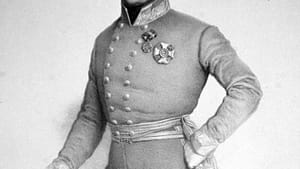Stay in the Loop
BSR publishes on a weekly schedule, with an email newsletter every Wednesday and Thursday morning. There’s no paywall, and subscribing is always free.
Second thoughts about Strauss and Radetzky on New Year's Eve

New Year’s Eve is about tradition, and so it will be for me this year as I head to the Philadelphia Orchestra’s annual New Year’s Eve concert — with one slight but glaring exception.
Monday night, as we’ve done for years, my wife and I will join some 2,000 other Philadelphia music lovers at the Kimmel. It’s a kitschy combination of classical gags (not an oxymoron), familiar chestnuts (Johann Strauss Jr.’s “On the Beautiful Blue Danube” and his overture to Die Fledermaus), and musical surprises. (Two years ago, the Metropolitan Opera soprano sang “Sempre Libera” from Verdi’s La Traviata with her husband John Myers, who popped up from his seat in the audience to sing the tenor’s response lines at the end; she also sang “Ah, Cruelle,” from the bogus opera composed by Bernard Herrmann for the film Citizen Kane in 1941.) The evening amounts to a 90-minute musical tasting menu, designed above all to propel listeners into the next year with good feelings about the orchestra, their community, and themselves.
An unofficial anthem
A reliable highlight of these concerts is the rollicking “Radetzky March,” which Johann Strauss Sr. dedicated in 1848 to an Austrian field marshal. At that time, it gained such popularity among marching soldiers that it became an unofficial Austrian national anthem; today it inspires rhythmic hand-clapping by formally attired New Year’s Eve audiences, not only in Philadelphia but in some of the world’s other great musical capitals. (Here it is performed on New Year’s Eve 1987 by Austrian conductor Herbert von Karajan and the Vienna Philharmonic.)
Marching from mayhem
But this year, the tradition may affect me differently. That’s because, over the summer, I read Joseph Roth’s haunting 1932 novel The Radetzky March.
Roth’s novel describes in excruciating detail the monotonous routines of Austrian army officers on the eve of World War I — a litany of carousing, gambling, procuring sex, gorging on pastries, and dueling over perceived slights — all of which ends, of course, with their own deaths as well as the destruction of their Habsburg Empire. All that’s necessary to distract these men from the emptiness of their lives, the dysfunction of their country, and the senility of their beloved Emperor Franz Joseph is the sound of Strauss’s rousing “Radetzky March” as it’s performed at their daily regimental drills.
There’s nothing quite like a military band to distract you from life’s harsh realities. I’m as much of a sucker for this pomp as anyone. During one lunch hour last year, when a Union League band dressed in Civil War costumes rounded City Hall and headed down Chestnut Street, I dropped what I was doing and marched along with them to Independence Hall. (And you wonder why Donald Trump was so eager to spend $92 million on a Veterans Day parade.)
In the past I have joined in the traditional clapping with gusto during the march’s New Year’s Eve spotlight, imagining myself somehow communing with my Austro-Hungarian ancestors in the process. But this year, I’m not sure how I’ll respond.
The Philadelphia Orchestra’s New Year’s Eve concert, conducted by Yannick Nézet-Séguin and featuring violinist Kimberly Fisher, is coming up on Monday, December 31, at 7:30pm at the Kimmel Center’s Verizon Hall (Broad and Spruce Streets, Philadelphia). Tickets ($60 to $135) are available online or by calling 215-893-1999.
Sign up for our newsletter
All of the week's new articles, all in one place. Sign up for the free weekly BSR newsletters, and don't miss a conversation.

 Dan Rottenberg
Dan Rottenberg